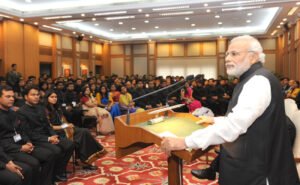Before knowing how to be an IAS officer, it is essential to know an IAS officer’s job.
An IAS officer helps the government in its administration and policy scaffolding. They also have the responsibility to execute the policies and deliver a response to the ministry about the execution status and consequences.
Accountable to the Parliament and State Legislatures, they supervise the allocation of budgets in their divisions. They are responsible for upholding law and order, collecting remuneration, managing crises, and more.
The job encompasses huge responsibilities and an extraordinary chance to enhance society.
Strategies To Follow To Become An IAS Officer
Here we are going to divide your whole preparatory phase into four stages.
Let’s dive right into the stages.
Stage I (90 days)- Get a clear idea about what you will prepare for. Know how you will prepare yourself in this period.
- Go through all the previous year’s prelims and mains papers. Know the detailed syllabus, watch toppers interviews. In this way, you will get to understand the pattern of the exam.
- In these two months, try to complete the NCERT books from classes 6 to 12.
- Read newspapers to stay updated.
Stage II (5 months)- After getting an idea about the exam pattern and its syllabus, you need to form your base. To strengthen your foundation, start with the ‘Modern History and Polity.’ This subject forms most of your study base, so it is suggested to start with this subject.
- In October, read either Polity by Laxmikanth or Bipan Chandra’s India’s Freedom struggle. Choose whichever you want. And in November, read the other book which you didn’t in October.
- It’s December! Finally, time to choose your optional subject.
- In the last three months of this stage, finish reading the following books.
- International Relations by Rajiv Sikri
- NCERT Economy concepts
- Environment and Ecology(Vision Notes),
- Leong’s Geography.
- V. N. Khanna for IR
- Don’t forget to read the newspapers daily.
An assortment of books and videos might help you complete the syllabus quicker and more efficiently.
Stage III (60 days)- In the first stage, you went through the previous year’s papers. But now it’s time to start solving them.
- Solve the previous year’s papers. Try writing answers and essays within a fixed time, daily. It helps to boost your pace.
- Read Vision IAS Current Affairs from August 2015 till now. Go through newspapers and magazines to keep yourself updated about the recent issue.
- Now it is time to prepare for GS and Optional concurrently. Choose the questions topic-wise and try answering them in your mind while studying. You can start with your favorite content to enhance your pace.
- At least spend 45 minutes to 1-hour reading newspapers and magazines.
Stage IV (90 days)- Invest this whole two months in revision. Revising what you studied for the rest of your preparatory phase is vital.
- Revise again and again.
- Practice writing answers within a fixed time.
- Go through the previous year’s papers.
- Take mock tests regularly.
- Newspaper reading is a must.
And your prelims are over!
Post Prelims Preparation
During this time, you practice writing answers for the Mains. Continue your newspaper reading and gather information on various topics. Read good magazines like Yojana.
Try to take mock tests daily for answer writing practice. Go through government reports as much as possible.
By the end of this phase, you would have taken your IAS mains exam.
Getting Ready for the Interview
After the UPSC mains exam, you get a couple of months before the results.
The results are out, and you found your name on the list; now what? Without wasting a second, start sharpening your aptitudes for the personality test.
Do not stop reading the newspaper daily. Stay healthy, stay fit. You can try watching related programs on television. Watch interviews and practice mock interviews. Bring out your best edition.
Do’s and Don’ts
| Do’s | Don’ts |
| Be ready for Main’s before Prelims. Try to finish at least 70% of the syllabus before the Prelims. | Do not study too many books. You can select 1-2 books for each subject of your choice. Try to stick to those books till the end. |
| Keep short notes on each GS topic prepared. | Do not be tedious. Loosening up is important too. Do some pass-time activities. Take short trips or small drives, or meet up with your friends. |
| Finish the optional once before Prelims. | |
| Practice answer writing daily before Prelims. | |
| Use the weekends for revising whatever you studied for the whole week. |
Which are the most scoring optional subjects for UPSC mains?
There are some subjects which are more scoring than others. However, IAS toppers have achieved 320+ in technical as well as non-technical contents.
According to the current UPSC syllabus and IAS results, here’s a list of UPSC’s top 10 optional subjects.
- Sociology
- Agriculture
- Medical Science
- Any literature subject
- Anthropology
- Public Administration
- Psychology
- Law
- Geography
- History
Optional Subjects with Highest Success Rate in IAS Exam
The chart below mentions the success-rate of optional subjects.
| Optional Subjects | Candidates Appeared | Candidates recommended | Success Rate |
| Sociology | 1421 | 137 | 9.6 |
| Agriculture | 89 | 11 | 12.4 |
| Medical Science | 313 | 32 | 10.2 |
| Anthropology | 880 | 85 | 9.7 |
| Public Administration | 1169 | 119 | 10.2 |
| Psychology | 193 | 21 | 10.9 |
| Law | 304 | 43 | 14.1 |
| Geography | 2669 | 147 | 5.5 |
| History | 1074 | 59 | 5.5 |
Parting messages
- Make smart and small notes. Make your notes so concise that one-page notes can remind you of the respective chapters. Each time you revise, try making the notes more concise.
- Practice writing essays and answers within a definite time. Try to take a minimum of 200 mock tests. Write your answers precisely, reasonably, and in a structured way.
- Connect and pertain current affairs in the answers you write. This confirms that you are beyond bookish knowledge. Also, it exhibits your connection with the real world.
- Try to keep your phone silent or out of your sight while studying. Give your 100% attention to the study.
- Focus on one subject and one book at a time.
Well, the most important thing, perhaps, is to enjoy the entire process. So enjoy the path, and your destination is bound to be beautiful.





